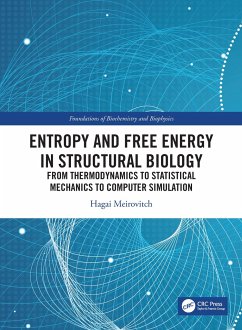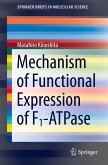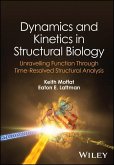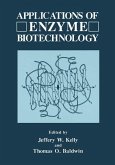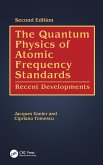Hagai Meirovitch
Entropy and Free Energy in Structural Biology
From Thermodynamics to Statistical Mechanics to Computer Simulation
Hagai Meirovitch
Entropy and Free Energy in Structural Biology
From Thermodynamics to Statistical Mechanics to Computer Simulation
- Gebundenes Buch
- Merkliste
- Auf die Merkliste
- Bewerten Bewerten
- Teilen
- Produkt teilen
- Produkterinnerung
- Produkterinnerung
Enhanced by a number of solved problems and examples, this volume will be a valuable resource to advanced undergraduate and graduate students in chemistry, chemical engineering, biochemistry biophysics, pharmacology, and computational biology.
Andere Kunden interessierten sich auch für
![Free Energy Calculations Free Energy Calculations]() Christophe Chipot / Andrew Pohorille (eds.)Free Energy Calculations291,99 €
Christophe Chipot / Andrew Pohorille (eds.)Free Energy Calculations291,99 €![Mechanism of Functional Expression of F1-ATPase Mechanism of Functional Expression of F1-ATPase]() Masahiro KinoshitaMechanism of Functional Expression of F1-ATPase42,99 €
Masahiro KinoshitaMechanism of Functional Expression of F1-ATPase42,99 €![Dynamics and Kinetics in Structural Biology Dynamics and Kinetics in Structural Biology]() Keith MoffatDynamics and Kinetics in Structural Biology174,99 €
Keith MoffatDynamics and Kinetics in Structural Biology174,99 €![Thermodynamics for Chemists, Physicists and Engineers Thermodynamics for Chemists, Physicists and Engineers]() Robert HolystThermodynamics for Chemists, Physicists and Engineers46,99 €
Robert HolystThermodynamics for Chemists, Physicists and Engineers46,99 €![Structure Analysis by Small-Angle X-Ray and Neutron Scattering Structure Analysis by Small-Angle X-Ray and Neutron Scattering]() L. A. FeiginStructure Analysis by Small-Angle X-Ray and Neutron Scattering100,99 €
L. A. FeiginStructure Analysis by Small-Angle X-Ray and Neutron Scattering100,99 €![Applications of Enzyme Biotechnology Applications of Enzyme Biotechnology]() Applications of Enzyme Biotechnology166,99 €
Applications of Enzyme Biotechnology166,99 €![The Quantum Physics of Atomic Frequency Standards The Quantum Physics of Atomic Frequency Standards]() Jacques VanierThe Quantum Physics of Atomic Frequency Standards337,99 €
Jacques VanierThe Quantum Physics of Atomic Frequency Standards337,99 €-
-
-
Enhanced by a number of solved problems and examples, this volume will be a valuable resource to advanced undergraduate and graduate students in chemistry, chemical engineering, biochemistry biophysics, pharmacology, and computational biology.
Hinweis: Dieser Artikel kann nur an eine deutsche Lieferadresse ausgeliefert werden.
Hinweis: Dieser Artikel kann nur an eine deutsche Lieferadresse ausgeliefert werden.
Produktdetails
- Produktdetails
- Verlag: CRC Press
- Seitenzahl: 374
- Erscheinungstermin: 3. September 2020
- Englisch
- Abmessung: 279mm x 216mm x 22mm
- Gewicht: 1202g
- ISBN-13: 9780367406929
- ISBN-10: 0367406926
- Artikelnr.: 60014607
- Herstellerkennzeichnung
- Libri GmbH
- Europaallee 1
- 36244 Bad Hersfeld
- gpsr@libri.de
- Verlag: CRC Press
- Seitenzahl: 374
- Erscheinungstermin: 3. September 2020
- Englisch
- Abmessung: 279mm x 216mm x 22mm
- Gewicht: 1202g
- ISBN-13: 9780367406929
- ISBN-10: 0367406926
- Artikelnr.: 60014607
- Herstellerkennzeichnung
- Libri GmbH
- Europaallee 1
- 36244 Bad Hersfeld
- gpsr@libri.de
Hagai Meirovitch is professor Emeritus in the Department of Computational and Systems Biology at the University of Pittsburgh School of Medicine. He earned an MSc degree in nuclear physics from the Hebrew University, a PhD degree in chemical physics from the Weizmann Institute, and conducted postdoctoral training in the laboratory of Professor Harold A. Scheraga at Cornell University. His research focused on developing computer simulation methodologies within the scope of statistical mechanics, as highlighted below. He devised novel methods for extracting the absolute entropy from Monte Carlo samples and techniques for generating polymer chains, which were used to study phase transitions in polymers, magnetic, and lattice gas systems. These methods, together with conformational search techniques for proteins, led to a free energy-based approach for treating molecular flexibility. This approach was used to analyze NMR relaxation data from cyclic peptides and to study structural preferences of surface loops in bound and free enzymes. He developed a new methodology for calculating the free energy of ligand/protein binding, which unlike standard techniques, provides the decrease in the ligand's entropy upon binding. Dr Meirovitch conducted part of the research depicted above, and other studies, at the Supercomputer Computations Research Institute of the Florida State University, Tallahassee.
Contents
Preface ..................................................................................................................................................... xv
Acknowledgments ...................................................................................................................................xix
Author .....................................................................................................................................................xxi
Section I Probability Theory
1. Probability and Its Applications ..................................................................................................... 3
1.1 Introduction ............................................................................................................................. 3
1.2 Experimental Probability ........................................................................................................ 3
1.3 The Sample Space Is Related to the Experiment .................................................................... 4
1.4 Elementary Probability Space ................................................................................................ 5
1.5 Basic Combinatorics ............................................................................................................... 6
1.5.1 Permutations ............................................................................................................. 6
1.5.2 Combinations ............................................................................................................ 7
1.6 Product Probability Spaces ..................................................................................................... 9
1.6.1 The Binomial Distribution .......................................................................................11
1.6.2 Poisson Theorem ......................................................................................................11
1.7 Dependent and Independent Events ...................................................................................... 12
1.7.1 Bayes Formula......................................................................................................... 12
1.8 Discrete Probability-Summary .......................................................................................... 13
1.9 One-Dimensional Discrete Random Variables ..................................................................... 13
1.9.1 The Cumulative Distribution Function ....................................................................14
1.9.2 The Random Variable of the Poisson Distribution ..................................................14
1.10 Continuous Random Variables ..............................................................................................14
1.10.1 The Normal Random Variable ................................................................................ 15
1.10.2 The Uniform Random Variable .............................................................................. 15
1.11 The Expectation Value ...........................................................................................................16
1.11.1 Examples ..................................................................................................................16
1.12 The Variance ..........................................................................................................................17
1.12.1 The Variance of the Poisson Distribution ................................................................18
1.12.2 The Variance of the Normal Distribution ................................................................18
1.13 Independent and Uncorrelated Random Variables ............................................................... 19
1.13.1 Correlation .............................................................................................................. 19
1.14 The Arithmetic Average ....................................................................................................... 20
1.15 The Central Limit Theorem .................................................................................................. 21
1.16 Sampling ............................................................................................................................... 23
1.17 Stochastic Processes-Markov Chains ................................................................................ 23
1.17.1 The Stationary Probabilities ................................................................................... 25
1.18 The Ergodic Theorem ........................................................................................................... 26
1.19 Autocorrelation Functions .................................................................................................... 27
1.19.1 Stationary Stochastic Processes .............................................................................. 28
Homework for Students .................................................................................................................... 28
A Comment about Notations ............................................................................................................ 28
References ........................................................................................................................................ 29
Section II Equilibrium Thermodynamics and Statistical Mechanics
2. Classical Thermodynamics ........................................................................................................... 33
2.1 Introduction ........................................................................................................................... 33
2.2 Macroscopic Mechanical Systems versus Thermodynamic Systems .................................. 33
2.3 Equilibrium and Reversible Transformations ....................................................................... 34
2.4 Ideal Gas Mechanical Work and Reversibility ..................................................................... 34
2.5 The First Law of Thermodynamics ...................................................................................... 36
2.6 Joule's Experiment ................................................................................................................ 37
2.7 Entropy .................................................................................................................................. 39
2.8 The Second Law of Thermodynamics .................................................................................. 40
2.8.1 Maximal Entropy in an Isolated System..................................................................41
2.8.2 Spontaneous Expansion of an Ideal Gas and Probability ....................................... 42
2.8.3 Reversible and Irreversible Processes Including Work ........................................... 42
2.9 The Third Law of Thermodynamics .................................................................................... 43
2.10 Thermodynamic Potentials ................................................................................................... 43
2.10.1 The Gibbs Relation ................................................................................................. 43
2.10.2 The Entropy as the Main Potential ......................................................................... 44
2.10.3 The Enthalpy ........................................................................................................... 45
2.10.4 The Helmholtz Free Energy .................................................................................... 45
2.10.5 The Gibbs Free Energy ........................................................................................... 45
2.10.6 The Free Energy, H(T,mi) ........................................................................................ 46
2.11 Maximal Work in Isothermal and Isobaric Transformations ............................................... 47
2.12 Euler's Theorem and Additional Relations for the Free Energies ........................................ 48
2.12.1 Gibbs-Duhem Equation .......................................................................................... 49
2.13 Summary ............................................................................................................................... 49
Homework for Students .................................................................................................................... 49
References ........................................................................................................................................ 49
Further Reading ................................................................................................................................ 49
3. From Thermodynamics to Statistical Mechanics ........................................................................51
3.1 Phase Space as a Probability Space .......................................................................................51
3.2 Derivation of the Boltzmann Probability ............................................................................. 52
3.3 Statistical Mechanics Averages ............................................................................................ 54
3.3.1 The Average Energy ................................................................................................ 54
3.3.2 The Average Entropy .............................................................................................. 54
3.3.3 The Helmholtz Free Energy .................................................................................... 55
3.4 Various Approaches for Calculating Thermodynamic Parameters ...................................... 55
3.4.1 Thermodynamic Approach ..................................................................................... 55
3.4.2 Probabilistic Approach ........................................................................................... 56
3.5 The Helmholtz Free Energy of a Simple Fluid ..................................................................... 56
Reference .......................................................................................................................................... 58
Further Reading ................................................................................................................................ 58
4. Ideal Gas and the Harmonic Oscillator ....................................................................................... 59
4.1 From a Free Particle in a Box to an Ideal Gas ...................................................................... 59
4.2 Properties of an Ideal Gas by the Thermodynamic Approach ............................................. 60
4.3 The chemical potential of an Ideal Gas ................................................................................ 62
4.4 Treating an Ideal Gas by the Probability Approach ............................................................. 63
4.5 The Macroscopic Harmonic Oscillator ................................................................................ 64
4.6 The Microscopic Oscillator .................................................................................................. 65
4.6.1 Partition Function and Thermodynamic Properties ............................................... 66
4.7 The Quantum Mechanical Oscillator ................................................................................... 68
4.8 Entropy and Information in Statistical Mechanics ............................................................... 71
4.9 The Configurational Partition Function ................................................................................ 71
Homework for Students .................................................................................................................... 72
References ........................................................................................................................................ 72
Further Reading ................................................................................................................................ 72
5. Fluctuations and the Most Probable Energy ............................................................................... 73
5.1 The Variances of the Energy and the Free Energy ............................................................... 73
5.2 The Most Contributing Energy E* ....................................................................................... 74
5.3 Solving Problems in Statistical Mechanics .......................................................................... 76
5.3.1 The Thermodynamic Approach .............................................................................. 77
5.3.2 The Probabilistic Approach .................................................................................... 78
5.3.3 Calculating the Most Probable Energy Term .......................................................... 79
5.3.4 The Change of Energy and Entropy with Temperature .......................................... 80
References ........................................................................................................................................ 81
6. Various Ensembles ......................................................................................................................... 83
6.1 The Microcanonical (petit) Ensemble .................................................................................. 83
6.2 The Canonical (NVT) Ensemble ........................................................................................... 84
6.3 The Gibbs (NpT) Ensemble .................................................................................................. 85
6.4 The Grand Canonical (miVT) Ensemble ................................................................................ 88
6.5 Averages and Variances in Different Ensembles .................................................................. 90
6.5.1 A Canonical Ensemble Solution (Maximal Term Method) .................................... 90
6.5.2 A Grand-Canonical Ensemble Solution .................................................................. 91
6.5.3 Fluctuations in Different Ensembles....................................................................... 91
References ........................................................................................................................................ 92
Further Reading ................................................................................................................................ 92
7. Phase Transitions ........................................................................................................................... 93
7.1 Finite Systems versus the Thermodynamic Limit ................................................................ 93
7.2 First-Order Phase Transitions ............................................................................................... 94
7.3 Second-Order Phase Transitions ........................................................................................... 95
References ........................................................................................................................................ 98
8. Ideal Polymer Chains ..................................................................................................................... 99
8.1 Models of Macromolecules ................................................................................................... 99
8.2 Statistical Mechanics of an Ideal Chain ............................................................................... 99
8.2.1 Partition Function and Thermodynamic Averages ............................................... 100
8.3 Entropic Forces in an One-Dimensional Ideal Chain..........................................................101
8.4 The Radius of Gyration ...................................................................................................... 104
8.5 The Critical Exponent ni ...................................................................................................... 105
8.6 Distribution of the End-to-End Distance ............................................................................ 106
8.6.1 Entropic Forces Derived from the Gaussian Distribution .................................... 107
8.7 The Distribution of the End-to-End Distance Obtained from the Central Limit Theorem .... 108
8.8 Ideal Chains and the Random Walk ................................................................................... 109
8.9 Ideal Chain as a Model of Reality .......................................................................................110
References .......................................................................................................................................110
9. Chains with Excluded Volume .....................................................................................................111
9.1 The Shape Exponent ni for Self-avoiding Walks ..................................................................111
9.2 The Partition Function .........................................................................................................112
9.3 Polymer Chain as a Critical System ....................................................................................113
9.4 Distribution of the End-to-End Distance .............................................................................114
9.5 The Effect of Solvent and Temperature on the Chain Size .................................................115
9.5.1 th Chains in d = 3 ...................................................................................................116
9.5.2 th Chains in d = 2 ...................................................................................................116
9.5.3 The Crossover Behavior Around th.........................................................................117
9.5.4 The Blob Picture ....................................................................................................118
9.6 Summary ..............................................................................................................................119
References .......................................................................................................................................119
Section III Topics in Non-Equilibrium Thermodynamics
and Statistical Mechanics
10. Basic Simulation Techniques: Metropolis Monte Carlo and Molecular Dynamics .............. 123
10.1 Introduction ......................................................................................................................... 123
10.2 Sampling the Energy and Entropy and New Notations ...................................................... 124
10.3 More About Importance Sampling ..................................................................................... 125
10.4 The Metropolis Monte Carlo Method ................................................................................. 126
10.4.1 Symmetric and Asymmetric MC Procedures ....................................................... 127
10.4.2 A Grand-Canonical MC Procedure ...................................................................... 128
10.5 Efficiency of Metropolis MC .............................................................................................. 129
10.6 Molecular Dynamics in the Microcanonical Ensemble ......................................................131
10.7 MD Simulations in the Canonical Ensemble ...................................................................... 134
10.8 Dynamic MD Calculations ..................................................................................................135
10.9 Efficiency of MD .................................................................................................................135
10.9.1 Periodic Boundary Conditions and Ewald Sums .................................................. 136
10.9.2 A Comment About MD Simulations and Entropy................................................ 136
References ...................................................................................................................................... 137
11. Non-Equilibrium Thermodynamics-Onsager Theory .......................................................... 139
11.1 Introduction ......................................................................................................................... 139
11.2 The Local-Equilibrium Hypothesis .................................................................................... 139
11.3 Entropy Production Due to Heat Flow in a Closed System ................................................ 140
11.4 Entropy Production in an Isolated System...........................................................................141
11.5 Extra Hypothesis: A Linear Relation Between Rates and Affinities ..................................142
11.5.1 Entropy of an Ideal Linear Chain Close to Equilibrium .......................................143
11.6 Fourier's Law-A Continuum Example of Linearity ......................................................... 144
11.7 Statistical Mechanics Picture of Irreversibility ...................................................................145
11.8 Time Reversal, Microscopic Reversibility, and the Principle of Detailed Balance ............147
11.9 Onsager's Reciprocal Relations ...........................................................................................149
11.10 Applications ........................................................................................................................ 150
11.11 Steady States and the Principle of Minimum Entropy Production .....................................151
11.12 Summary ..............................................................................................................................152
References .......................................................................................................................................152
12. Non-equilibrium Statistical Mechanics ......................................................................................153
12.1 Fick's Laws for Diffusion ....................................................................................................153
12.1.1 First Fick's Law ......................................................................................................153
12.1.2 Calculation of the Flux from Thermodynamic Considerations ............................ 154
12.1.3 The Continuity Equation ........................................................................................155
12.1.4 Second Fick's Law-The Diffusion Equation ...................................................... 156
12.1.5 Diffusion of Particles Through a Membrane ........................................................ 156
12.1.6 Self-Diffusion ........................................................................................................ 156
12.2 Brownian Motion: Einstein's Derivation of the Diffusion Equation .................................. 158
12.3 Langevin Equation .............................................................................................................. 160
12.3.1 The Average Velocity and the Fluctuation-Dissipation Theorem .........................162
12.3.2 Correlation Functions.............................................................................................163
12.3.3 The Displacement of a Langevin Particle ............................................................. 164
12.3.4 The Probability Distributions of the Velocity and the Displacement ................... 166
12.3.5 Langevin Equation with a Charge in an Electric Field ..........................................168
12.3.6 Langevin Equation with an External Force-The Strong Damping Velocity .......168
12.4 Stochastic Dynamics Simulations .......................................................................................169
12.4.1 Generating Numbers from a Gaussian Distribution by CLT .................................170
12.4.2 Stochastic Dynamics versus Molecular Dynamics................................................171
12.5 The Fokker-Planck Equation ...............................................................................................171
12.6 Smoluchowski Equation.......................................................................................................174
12.7 The Fokker-Planck Equation for a Full Langevin Equation with a Force...........................175
12.8 Summary of Pairs of Equations ...........................................................................................175
References .......................................................................................................................................176
13. The Master Equation ....................................................................................................................177
13.1 Master Equation in a Microcanonical System .....................................................................177
13.2 Master Equation in the Canonical Ensemble.......................................................................178
13.3 An Example from Magnetic Resonance ............................................................................. 180
13.3.1 Relaxation Processes Under Various Conditions ...................................................181
13.3.2 Steady State and the Rate of Entropy Production ................................................. 184
13.4 The Principle of Minimum Entropy Production-Statistical Mechanics Example............185
References .......................................................................................................................................186
Section IV Advanced Simulation Methods: Polymers
and Biological Macromolecules
14. Growth Simulation Methods for Polymers .................................................................................189
14.1 Simple Sampling of Ideal Chains ........................................................................................189
14.2 Simple Sampling of SAWs .................................................................................................. 190
14.3 The Enrichment Method ..................................................................................................... 192
14.4 The Rosenbluth and Rosenbluth Method ............................................................................ 193
14.5 The Scanning Method ......................................................................................................... 195
14.5.1 The Complete Scanning Method .......................................................................... 195
14.5.2 The Partial Scanning Method ............................................................................... 196
14.5.3 Treating SAWs with Finite Interactions ................................................................ 197
14.5.4 A Lower Bound for the Entropy ........................................................................... 197
14.5.5 A Mean-Field Parameter ....................................................................................... 198
14.5.6 Eliminating the Bias by Schmidt's Procedure ...................................................... 199
14.5.7 Correlations in the Accepted Sample ................................................................... 200
14.5.8 Criteria for Efficiency ........................................................................................... 201
14.5.9 Locating Transition Temperatures ........................................................................ 202
14.5.10 The Scanning Method versus Other Techniques .................................................. 203
14.5.11 The Stochastic Double Scanning Method ............................................................ 204
14.5.12 Future Scanning by Monte Carlo .......................................................................... 204
14.5.13 The Scanning Method for the Ising Model and Bulk Systems ............................. 205
14.6 The Dimerization Method .................................................................................................. 206
References ...................................................................................................................................... 208
15. The Pivot Algorithm and Hybrid Techniques ............................................................................211
15.1 The Pivot Algorithm-Historical Notes ..............................................................................211
15.2 Ergodicity and Efficiency ....................................................................................................211
15.3 Applicability ........................................................................................................................212
15.4 Hybrid and Grand-Canonical Simulation Methods .............................................................213
15.5 Concluding Remarks ............................................................................................................214
References .......................................................................................................................................214
16. Models of Proteins .........................................................................................................................217
16.1 Biological Macromolecules versus Polymers ......................................................................217
16.2 Definition of a Protein Chain ...............................................................................................217
16.3 The Force Field of a Protein ................................................................................................218
16.4 Implicit Solvation Models ....................................................................................................219
16.5 A Protein in an Explicit Solvent ......................................................................................... 220
16.6 Potential Energy Surface of a Protein ................................................................................ 221
16.7 The Problem of Protein Folding ......................................................................................... 222
16.8 Methods for a Conformational Search ................................................................................ 222
16.8.1 Local Minimization-The Steepest Descents Method ........................................ 223
16.8.2 Monte Carlo Minimization ................................................................................... 224
16.8.3 Simulated Annealing ............................................................................................ 225
16.9 Monte Carlo and Molecular Dynamics Applied to Proteins .............................................. 225
16.10 Microstates and Intermediate Flexibility ........................................................................... 226
16.10.1 On the Practical Definition of a Microstate .......................................................... 227
References ...................................................................................................................................... 227
17. Calculation of the Entropy and the Free Energy by Thermodynamic Integration ................231
17.1 "Calorimetric" Thermodynamic Integration ...................................................................... 232
17.2 The Free Energy Perturbation Formula .............................................................................. 232
17.3 The Thermodynamic Integration Formula of Kirkwood ................................................... 234
17.4 Applications ........................................................................................................................ 235
17.4.1 Absolute Entropy of a SAW Integrated from an Ideal Chain Reference State ..... 235
17.4.2 Harmonic Reference State of a Peptide ................................................................ 237
17.5 Thermodynamic Cycles ...................................................................................................... 237
17.5.1 Other Cycles .......................................................................................................... 240
17.5.2 Problems of TI and FEP Applied to Proteins ....................................................... 240
References ...................................................................................................................................... 241
18. Direct Calculation of the Absolute Entropy and Free Energy ................................................ 243
18.1 Absolute Free Energy from E/kBT]> ...................................................................... 243
18.2 The Harmonic Approximation ........................................................................................... 244
18.3 The M2 Method .................................................................................................................. 245
18.4 The Quasi-Harmonic Approximation ................................................................................. 246
18.5 The Mutual Information Expansion ................................................................................... 247
18.6 The Nearest Neighbor Technique ....................................................................................... 248
18.7 The MIE-NN Method ......................................................................................................... 249
18.8 Hybrid Approaches ............................................................................................................. 249
References ...................................................................................................................................... 249
19. Calculation of the Absolute Entropy from a Single Monte Carlo Sample...............................251
19.1 The Hypothetical Scanning (HS) Method for SAWs ...........................................................251
19.1.1 An Exact HS Method .............................................................................................251
19.1.2 Approximate HS Method ...................................................................................... 252
19.2 The HS Monte Carlo (HSMC) Method .............................................................................. 253
19.3 Upper Bounds and Exact Functionals for the Free Energy ................................................ 255
19.3.1 The Upper Bound FB ............................................................................................ 255
19.3.2 FB Calculated by the Reversed Schmidt Procedure ............................................. 256
19.3.3 A Gaussian Estimation of FB ................................................................................ 257
19.3.4 Exact Expression for the Free Energy .................................................................. 258
19.3.5 The Correlation Between sA and FA ..................................................................... 258
19.3.6 Entropy Results for SAWs on a Square Lattice .................................................... 259
19.4 HS and HSMC Applied to the Ising Model ........................................................................ 260
19.5 The HS and HSMC Methods for a Continuum Fluid ..........................................................261
19.5.1 The HS Method ......................................................................................................261
19.5.2 The HSMC Method ............................................................................................... 262
19.5.3 Results for Argon and Water ................................................................................. 264
19.5.3.1 Results for Argon .................................................................................. 264
19.5.3.2 Results for Water .................................................................................. 266
19.6 HSMD Applied to a Peptide ............................................................................................... 266
19.6.1 Applications .......................................................................................................... 269
19.7 The HSMD-TI Method ....................................................................................................... 269
19.8 The LS Method ................................................................................................................... 270
19.8.1 The LS Method Applied to the Ising Model ......................................................... 270
19.8.2 The LS Method Applied to a Peptide ................................................................... 272
References .......................................................................................................................................274
20. The Potential of Mean Force, Umbrella Sampling, and Related Techniques ........................ 277
20.1 Umbrella Sampling ............................................................................................................. 277
20.2 Bennett's Acceptance Ratio ................................................................................................ 278
20.3 The Potential of Mean Force .............................................................................................. 281
20.3.1 Applications .......................................................................................................... 284
20.4 The Self-Consistent Histogram Method ............................................................................. 285
20.4.1 Free Energy from a Single Simulation.................................................................. 286
20.4.2 Multiple Simulations and The Self-Consistent Procedure.................................... 286
20.5 The Weighted Histogram Analysis Method ....................................................................... 289
20.5.1 The Single Histogram Equations .......................................................................... 290
20.5.2 The WHAM Equations ..........................................................................................291
20.5.3 Enhancements of WHAM .................................................................................... 293
20.5.4 The Basic MBAR Equation .................................................................................. 295
20.5.5 ST-WHAM and UIM ............................................................................................ 296
20.5.6 Summary ............................................................................................................... 296
References ...................................................................................................................................... 297
21. Advanced Simulation Methods and Free Energy Techniques ................................................. 301
21.1 Replica-Exchange ............................................................................................................... 301
21.1.1 Temperature-Based REM ..................................................................................... 301
21.1.2 Hamiltonian-Dependent Replica Exchange .......................................................... 305
21.2 The Multicanonical Method ............................................................................................... 308
21.2.1 Applications ...........................................................................................................311
21.2.2 MUCA-Summary ..................................................................................................312
21.3 The Method of Wang and Landau .......................................................................................312
21.3.1 The Wang and Landau Method-Applications ........................................................314
21.4 The Method of Expanded Ensembles ..................................................................................315
21.4.1 The Method of Expanded Ensembles-Applications ..............................................317
21.5 The Adaptive Integration Method .......................................................................................317
21.6 Methods Based on Jarzynski's Identity ...............................................................................319
21.6.1 Jarzynski's Identity versus Other Methods for Calculating DeltaF ........................... 323
21.7 Summary ............................................................................................................................. 324
References ...................................................................................................................................... 324
22. Simulation of the Chemical Potential ..........................................................................................331
22.1 The Widom Insertion Method .............................................................................................331
22.2 The Deletion Procedure .......................................................................................................332
22.3 Personage's Method for Treating Deletion ......................................................................... 334
22.4 Introduction of a Hard Sphere ............................................................................................ 336
22.5 The Ideal Gas Gauge Method ............................................................................................. 337
22.6 Calculation of the Chemical Potential of a Polymer by the Scanning Method .................. 338
22.7 The Incremental Chemical Potential Method for Polymers ............................................... 340
22.8 Calculation of mi by Thermodynamic Integration ................................................................341
References .......................................................................................................................................341
23. The Absolute Free Energy of Binding ........................................................................................ 343
23.1 The Law of Mass Action ..................................................................................................... 343
23.2 Chemical Potential, Fugacity, and Activity of an Ideal Gas............................................... 344
23.2.1 Thermodynamics .................................................................................................. 344
23.2.2 Canonical Ensemble.............................................................................................. 344
23.2.3 NpT Ensemble ....................................................................................................... 345
23.3 Chemical Potential in Ideal Solutions: Raoult's and Henry's Laws ................................... 345
23.3.1 Raoult's Law ......................................................................................................... 346
23.3.2 Henry's Law .......................................................................................................... 346
23.4 Chemical Potential in Non-ideal Solutions ......................................................................... 346
23.4.1 Solvent ................................................................................................................... 346
23.4.2 Solute ..................................................................................................................... 347
23.5 Thermodynamic Treatment of Chemical Equilibrium ....................................................... 347
23.6 Chemical Equilibrium in Ideal Gas Mixtures: Statistical Mechanics ................................ 348
23.7 Pressure-Dependent Equilibrium Constant of Ideal Gas Mixtures .................................... 349
23.8 Protein-Ligand Binding ...................................................................................................... 350
23.8.1 Standard Methods for Calculating DeltaA0 .................................................................352
23.8.2 Calculating DeltaA0 by HSMD-TI .............................................................................. 354
23.8.3 HSMD-TI Applied to the FKBP12-FK506 Complex: Equilibration ................... 356
23.8.4 The Internal and External Entropies..................................................................... 357
23.8.5 TI Results for FKBP12-FK506 ............................................................................. 360
23.8.6 DeltaA0 Results for FKBP12-FK506 .......................................................................... 360
23.9 Summary ............................................................................................................................. 362
References ...................................................................................................................................... 362
Appendix ............................................................................................................................................... 367
Index ...................................................................................................................................................... 369
Contents
Preface ..................................................................................................................................................... xv
Acknowledgments ...................................................................................................................................xix
Author .....................................................................................................................................................xxi
Section I Probability Theory
1. Probability and Its Applications ..................................................................................................... 3
1.1 Introduction ............................................................................................................................. 3
1.2 Experimental Probability ........................................................................................................ 3
1.3 The Sample Space Is Related to the Experiment .................................................................... 4
1.4 Elementary Probability Space ................................................................................................ 5
1.5 Basic Combinatorics ............................................................................................................... 6
1.5.1 Permutations ............................................................................................................. 6
1.5.2 Combinations ............................................................................................................ 7
1.6 Product Probability Spaces ..................................................................................................... 9
1.6.1 The Binomial Distribution .......................................................................................11
1.6.2 Poisson Theorem ......................................................................................................11
1.7 Dependent and Independent Events ...................................................................................... 12
1.7.1 Bayes Formula......................................................................................................... 12
1.8 Discrete Probability-Summary .......................................................................................... 13
1.9 One-Dimensional Discrete Random Variables ..................................................................... 13
1.9.1 The Cumulative Distribution Function ....................................................................14
1.9.2 The Random Variable of the Poisson Distribution ..................................................14
1.10 Continuous Random Variables ..............................................................................................14
1.10.1 The Normal Random Variable ................................................................................ 15
1.10.2 The Uniform Random Variable .............................................................................. 15
1.11 The Expectation Value ...........................................................................................................16
1.11.1 Examples ..................................................................................................................16
1.12 The Variance ..........................................................................................................................17
1.12.1 The Variance of the Poisson Distribution ................................................................18
1.12.2 The Variance of the Normal Distribution ................................................................18
1.13 Independent and Uncorrelated Random Variables ............................................................... 19
1.13.1 Correlation .............................................................................................................. 19
1.14 The Arithmetic Average ....................................................................................................... 20
1.15 The Central Limit Theorem .................................................................................................. 21
1.16 Sampling ............................................................................................................................... 23
1.17 Stochastic Processes-Markov Chains ................................................................................ 23
1.17.1 The Stationary Probabilities ................................................................................... 25
1.18 The Ergodic Theorem ........................................................................................................... 26
1.19 Autocorrelation Functions .................................................................................................... 27
1.19.1 Stationary Stochastic Processes .............................................................................. 28
Homework for Students .................................................................................................................... 28
A Comment about Notations ............................................................................................................ 28
References ........................................................................................................................................ 29
Section II Equilibrium Thermodynamics and Statistical Mechanics
2. Classical Thermodynamics ........................................................................................................... 33
2.1 Introduction ........................................................................................................................... 33
2.2 Macroscopic Mechanical Systems versus Thermodynamic Systems .................................. 33
2.3 Equilibrium and Reversible Transformations ....................................................................... 34
2.4 Ideal Gas Mechanical Work and Reversibility ..................................................................... 34
2.5 The First Law of Thermodynamics ...................................................................................... 36
2.6 Joule's Experiment ................................................................................................................ 37
2.7 Entropy .................................................................................................................................. 39
2.8 The Second Law of Thermodynamics .................................................................................. 40
2.8.1 Maximal Entropy in an Isolated System..................................................................41
2.8.2 Spontaneous Expansion of an Ideal Gas and Probability ....................................... 42
2.8.3 Reversible and Irreversible Processes Including Work ........................................... 42
2.9 The Third Law of Thermodynamics .................................................................................... 43
2.10 Thermodynamic Potentials ................................................................................................... 43
2.10.1 The Gibbs Relation ................................................................................................. 43
2.10.2 The Entropy as the Main Potential ......................................................................... 44
2.10.3 The Enthalpy ........................................................................................................... 45
2.10.4 The Helmholtz Free Energy .................................................................................... 45
2.10.5 The Gibbs Free Energy ........................................................................................... 45
2.10.6 The Free Energy, H(T,mi) ........................................................................................ 46
2.11 Maximal Work in Isothermal and Isobaric Transformations ............................................... 47
2.12 Euler's Theorem and Additional Relations for the Free Energies ........................................ 48
2.12.1 Gibbs-Duhem Equation .......................................................................................... 49
2.13 Summary ............................................................................................................................... 49
Homework for Students .................................................................................................................... 49
References ........................................................................................................................................ 49
Further Reading ................................................................................................................................ 49
3. From Thermodynamics to Statistical Mechanics ........................................................................51
3.1 Phase Space as a Probability Space .......................................................................................51
3.2 Derivation of the Boltzmann Probability ............................................................................. 52
3.3 Statistical Mechanics Averages ............................................................................................ 54
3.3.1 The Average Energy ................................................................................................ 54
3.3.2 The Average Entropy .............................................................................................. 54
3.3.3 The Helmholtz Free Energy .................................................................................... 55
3.4 Various Approaches for Calculating Thermodynamic Parameters ...................................... 55
3.4.1 Thermodynamic Approach ..................................................................................... 55
3.4.2 Probabilistic Approach ........................................................................................... 56
3.5 The Helmholtz Free Energy of a Simple Fluid ..................................................................... 56
Reference .......................................................................................................................................... 58
Further Reading ................................................................................................................................ 58
4. Ideal Gas and the Harmonic Oscillator ....................................................................................... 59
4.1 From a Free Particle in a Box to an Ideal Gas ...................................................................... 59
4.2 Properties of an Ideal Gas by the Thermodynamic Approach ............................................. 60
4.3 The chemical potential of an Ideal Gas ................................................................................ 62
4.4 Treating an Ideal Gas by the Probability Approach ............................................................. 63
4.5 The Macroscopic Harmonic Oscillator ................................................................................ 64
4.6 The Microscopic Oscillator .................................................................................................. 65
4.6.1 Partition Function and Thermodynamic Properties ............................................... 66
4.7 The Quantum Mechanical Oscillator ................................................................................... 68
4.8 Entropy and Information in Statistical Mechanics ............................................................... 71
4.9 The Configurational Partition Function ................................................................................ 71
Homework for Students .................................................................................................................... 72
References ........................................................................................................................................ 72
Further Reading ................................................................................................................................ 72
5. Fluctuations and the Most Probable Energy ............................................................................... 73
5.1 The Variances of the Energy and the Free Energy ............................................................... 73
5.2 The Most Contributing Energy E* ....................................................................................... 74
5.3 Solving Problems in Statistical Mechanics .......................................................................... 76
5.3.1 The Thermodynamic Approach .............................................................................. 77
5.3.2 The Probabilistic Approach .................................................................................... 78
5.3.3 Calculating the Most Probable Energy Term .......................................................... 79
5.3.4 The Change of Energy and Entropy with Temperature .......................................... 80
References ........................................................................................................................................ 81
6. Various Ensembles ......................................................................................................................... 83
6.1 The Microcanonical (petit) Ensemble .................................................................................. 83
6.2 The Canonical (NVT) Ensemble ........................................................................................... 84
6.3 The Gibbs (NpT) Ensemble .................................................................................................. 85
6.4 The Grand Canonical (miVT) Ensemble ................................................................................ 88
6.5 Averages and Variances in Different Ensembles .................................................................. 90
6.5.1 A Canonical Ensemble Solution (Maximal Term Method) .................................... 90
6.5.2 A Grand-Canonical Ensemble Solution .................................................................. 91
6.5.3 Fluctuations in Different Ensembles....................................................................... 91
References ........................................................................................................................................ 92
Further Reading ................................................................................................................................ 92
7. Phase Transitions ........................................................................................................................... 93
7.1 Finite Systems versus the Thermodynamic Limit ................................................................ 93
7.2 First-Order Phase Transitions ............................................................................................... 94
7.3 Second-Order Phase Transitions ........................................................................................... 95
References ........................................................................................................................................ 98
8. Ideal Polymer Chains ..................................................................................................................... 99
8.1 Models of Macromolecules ................................................................................................... 99
8.2 Statistical Mechanics of an Ideal Chain ............................................................................... 99
8.2.1 Partition Function and Thermodynamic Averages ............................................... 100
8.3 Entropic Forces in an One-Dimensional Ideal Chain..........................................................101
8.4 The Radius of Gyration ...................................................................................................... 104
8.5 The Critical Exponent ni ...................................................................................................... 105
8.6 Distribution of the End-to-End Distance ............................................................................ 106
8.6.1 Entropic Forces Derived from the Gaussian Distribution .................................... 107
8.7 The Distribution of the End-to-End Distance Obtained from the Central Limit Theorem .... 108
8.8 Ideal Chains and the Random Walk ................................................................................... 109
8.9 Ideal Chain as a Model of Reality .......................................................................................110
References .......................................................................................................................................110
9. Chains with Excluded Volume .....................................................................................................111
9.1 The Shape Exponent ni for Self-avoiding Walks ..................................................................111
9.2 The Partition Function .........................................................................................................112
9.3 Polymer Chain as a Critical System ....................................................................................113
9.4 Distribution of the End-to-End Distance .............................................................................114
9.5 The Effect of Solvent and Temperature on the Chain Size .................................................115
9.5.1 th Chains in d = 3 ...................................................................................................116
9.5.2 th Chains in d = 2 ...................................................................................................116
9.5.3 The Crossover Behavior Around th.........................................................................117
9.5.4 The Blob Picture ....................................................................................................118
9.6 Summary ..............................................................................................................................119
References .......................................................................................................................................119
Section III Topics in Non-Equilibrium Thermodynamics
and Statistical Mechanics
10. Basic Simulation Techniques: Metropolis Monte Carlo and Molecular Dynamics .............. 123
10.1 Introduction ......................................................................................................................... 123
10.2 Sampling the Energy and Entropy and New Notations ...................................................... 124
10.3 More About Importance Sampling ..................................................................................... 125
10.4 The Metropolis Monte Carlo Method ................................................................................. 126
10.4.1 Symmetric and Asymmetric MC Procedures ....................................................... 127
10.4.2 A Grand-Canonical MC Procedure ...................................................................... 128
10.5 Efficiency of Metropolis MC .............................................................................................. 129
10.6 Molecular Dynamics in the Microcanonical Ensemble ......................................................131
10.7 MD Simulations in the Canonical Ensemble ...................................................................... 134
10.8 Dynamic MD Calculations ..................................................................................................135
10.9 Efficiency of MD .................................................................................................................135
10.9.1 Periodic Boundary Conditions and Ewald Sums .................................................. 136
10.9.2 A Comment About MD Simulations and Entropy................................................ 136
References ...................................................................................................................................... 137
11. Non-Equilibrium Thermodynamics-Onsager Theory .......................................................... 139
11.1 Introduction ......................................................................................................................... 139
11.2 The Local-Equilibrium Hypothesis .................................................................................... 139
11.3 Entropy Production Due to Heat Flow in a Closed System ................................................ 140
11.4 Entropy Production in an Isolated System...........................................................................141
11.5 Extra Hypothesis: A Linear Relation Between Rates and Affinities ..................................142
11.5.1 Entropy of an Ideal Linear Chain Close to Equilibrium .......................................143
11.6 Fourier's Law-A Continuum Example of Linearity ......................................................... 144
11.7 Statistical Mechanics Picture of Irreversibility ...................................................................145
11.8 Time Reversal, Microscopic Reversibility, and the Principle of Detailed Balance ............147
11.9 Onsager's Reciprocal Relations ...........................................................................................149
11.10 Applications ........................................................................................................................ 150
11.11 Steady States and the Principle of Minimum Entropy Production .....................................151
11.12 Summary ..............................................................................................................................152
References .......................................................................................................................................152
12. Non-equilibrium Statistical Mechanics ......................................................................................153
12.1 Fick's Laws for Diffusion ....................................................................................................153
12.1.1 First Fick's Law ......................................................................................................153
12.1.2 Calculation of the Flux from Thermodynamic Considerations ............................ 154
12.1.3 The Continuity Equation ........................................................................................155
12.1.4 Second Fick's Law-The Diffusion Equation ...................................................... 156
12.1.5 Diffusion of Particles Through a Membrane ........................................................ 156
12.1.6 Self-Diffusion ........................................................................................................ 156
12.2 Brownian Motion: Einstein's Derivation of the Diffusion Equation .................................. 158
12.3 Langevin Equation .............................................................................................................. 160
12.3.1 The Average Velocity and the Fluctuation-Dissipation Theorem .........................162
12.3.2 Correlation Functions.............................................................................................163
12.3.3 The Displacement of a Langevin Particle ............................................................. 164
12.3.4 The Probability Distributions of the Velocity and the Displacement ................... 166
12.3.5 Langevin Equation with a Charge in an Electric Field ..........................................168
12.3.6 Langevin Equation with an External Force-The Strong Damping Velocity .......168
12.4 Stochastic Dynamics Simulations .......................................................................................169
12.4.1 Generating Numbers from a Gaussian Distribution by CLT .................................170
12.4.2 Stochastic Dynamics versus Molecular Dynamics................................................171
12.5 The Fokker-Planck Equation ...............................................................................................171
12.6 Smoluchowski Equation.......................................................................................................174
12.7 The Fokker-Planck Equation for a Full Langevin Equation with a Force...........................175
12.8 Summary of Pairs of Equations ...........................................................................................175
References .......................................................................................................................................176
13. The Master Equation ....................................................................................................................177
13.1 Master Equation in a Microcanonical System .....................................................................177
13.2 Master Equation in the Canonical Ensemble.......................................................................178
13.3 An Example from Magnetic Resonance ............................................................................. 180
13.3.1 Relaxation Processes Under Various Conditions ...................................................181
13.3.2 Steady State and the Rate of Entropy Production ................................................. 184
13.4 The Principle of Minimum Entropy Production-Statistical Mechanics Example............185
References .......................................................................................................................................186
Section IV Advanced Simulation Methods: Polymers
and Biological Macromolecules
14. Growth Simulation Methods for Polymers .................................................................................189
14.1 Simple Sampling of Ideal Chains ........................................................................................189
14.2 Simple Sampling of SAWs .................................................................................................. 190
14.3 The Enrichment Method ..................................................................................................... 192
14.4 The Rosenbluth and Rosenbluth Method ............................................................................ 193
14.5 The Scanning Method ......................................................................................................... 195
14.5.1 The Complete Scanning Method .......................................................................... 195
14.5.2 The Partial Scanning Method ............................................................................... 196
14.5.3 Treating SAWs with Finite Interactions ................................................................ 197
14.5.4 A Lower Bound for the Entropy ........................................................................... 197
14.5.5 A Mean-Field Parameter ....................................................................................... 198
14.5.6 Eliminating the Bias by Schmidt's Procedure ...................................................... 199
14.5.7 Correlations in the Accepted Sample ................................................................... 200
14.5.8 Criteria for Efficiency ........................................................................................... 201
14.5.9 Locating Transition Temperatures ........................................................................ 202
14.5.10 The Scanning Method versus Other Techniques .................................................. 203
14.5.11 The Stochastic Double Scanning Method ............................................................ 204
14.5.12 Future Scanning by Monte Carlo .......................................................................... 204
14.5.13 The Scanning Method for the Ising Model and Bulk Systems ............................. 205
14.6 The Dimerization Method .................................................................................................. 206
References ...................................................................................................................................... 208
15. The Pivot Algorithm and Hybrid Techniques ............................................................................211
15.1 The Pivot Algorithm-Historical Notes ..............................................................................211
15.2 Ergodicity and Efficiency ....................................................................................................211
15.3 Applicability ........................................................................................................................212
15.4 Hybrid and Grand-Canonical Simulation Methods .............................................................213
15.5 Concluding Remarks ............................................................................................................214
References .......................................................................................................................................214
16. Models of Proteins .........................................................................................................................217
16.1 Biological Macromolecules versus Polymers ......................................................................217
16.2 Definition of a Protein Chain ...............................................................................................217
16.3 The Force Field of a Protein ................................................................................................218
16.4 Implicit Solvation Models ....................................................................................................219
16.5 A Protein in an Explicit Solvent ......................................................................................... 220
16.6 Potential Energy Surface of a Protein ................................................................................ 221
16.7 The Problem of Protein Folding ......................................................................................... 222
16.8 Methods for a Conformational Search ................................................................................ 222
16.8.1 Local Minimization-The Steepest Descents Method ........................................ 223
16.8.2 Monte Carlo Minimization ................................................................................... 224
16.8.3 Simulated Annealing ............................................................................................ 225
16.9 Monte Carlo and Molecular Dynamics Applied to Proteins .............................................. 225
16.10 Microstates and Intermediate Flexibility ........................................................................... 226
16.10.1 On the Practical Definition of a Microstate .......................................................... 227
References ...................................................................................................................................... 227
17. Calculation of the Entropy and the Free Energy by Thermodynamic Integration ................231
17.1 "Calorimetric" Thermodynamic Integration ...................................................................... 232
17.2 The Free Energy Perturbation Formula .............................................................................. 232
17.3 The Thermodynamic Integration Formula of Kirkwood ................................................... 234
17.4 Applications ........................................................................................................................ 235
17.4.1 Absolute Entropy of a SAW Integrated from an Ideal Chain Reference State ..... 235
17.4.2 Harmonic Reference State of a Peptide ................................................................ 237
17.5 Thermodynamic Cycles ...................................................................................................... 237
17.5.1 Other Cycles .......................................................................................................... 240
17.5.2 Problems of TI and FEP Applied to Proteins ....................................................... 240
References ...................................................................................................................................... 241
18. Direct Calculation of the Absolute Entropy and Free Energy ................................................ 243
18.1 Absolute Free Energy from E/kBT]> ...................................................................... 243
18.2 The Harmonic Approximation ........................................................................................... 244
18.3 The M2 Method .................................................................................................................. 245
18.4 The Quasi-Harmonic Approximation ................................................................................. 246
18.5 The Mutual Information Expansion ................................................................................... 247
18.6 The Nearest Neighbor Technique ....................................................................................... 248
18.7 The MIE-NN Method ......................................................................................................... 249
18.8 Hybrid Approaches ............................................................................................................. 249
References ...................................................................................................................................... 249
19. Calculation of the Absolute Entropy from a Single Monte Carlo Sample...............................251
19.1 The Hypothetical Scanning (HS) Method for SAWs ...........................................................251
19.1.1 An Exact HS Method .............................................................................................251
19.1.2 Approximate HS Method ...................................................................................... 252
19.2 The HS Monte Carlo (HSMC) Method .............................................................................. 253
19.3 Upper Bounds and Exact Functionals for the Free Energy ................................................ 255
19.3.1 The Upper Bound FB ............................................................................................ 255
19.3.2 FB Calculated by the Reversed Schmidt Procedure ............................................. 256
19.3.3 A Gaussian Estimation of FB ................................................................................ 257
19.3.4 Exact Expression for the Free Energy .................................................................. 258
19.3.5 The Correlation Between sA and FA ..................................................................... 258
19.3.6 Entropy Results for SAWs on a Square Lattice .................................................... 259
19.4 HS and HSMC Applied to the Ising Model ........................................................................ 260
19.5 The HS and HSMC Methods for a Continuum Fluid ..........................................................261
19.5.1 The HS Method ......................................................................................................261
19.5.2 The HSMC Method ............................................................................................... 262
19.5.3 Results for Argon and Water ................................................................................. 264
19.5.3.1 Results for Argon .................................................................................. 264
19.5.3.2 Results for Water .................................................................................. 266
19.6 HSMD Applied to a Peptide ............................................................................................... 266
19.6.1 Applications .......................................................................................................... 269
19.7 The HSMD-TI Method ....................................................................................................... 269
19.8 The LS Method ................................................................................................................... 270
19.8.1 The LS Method Applied to the Ising Model ......................................................... 270
19.8.2 The LS Method Applied to a Peptide ................................................................... 272
References .......................................................................................................................................274
20. The Potential of Mean Force, Umbrella Sampling, and Related Techniques ........................ 277
20.1 Umbrella Sampling ............................................................................................................. 277
20.2 Bennett's Acceptance Ratio ................................................................................................ 278
20.3 The Potential of Mean Force .............................................................................................. 281
20.3.1 Applications .......................................................................................................... 284
20.4 The Self-Consistent Histogram Method ............................................................................. 285
20.4.1 Free Energy from a Single Simulation.................................................................. 286
20.4.2 Multiple Simulations and The Self-Consistent Procedure.................................... 286
20.5 The Weighted Histogram Analysis Method ....................................................................... 289
20.5.1 The Single Histogram Equations .......................................................................... 290
20.5.2 The WHAM Equations ..........................................................................................291
20.5.3 Enhancements of WHAM .................................................................................... 293
20.5.4 The Basic MBAR Equation .................................................................................. 295
20.5.5 ST-WHAM and UIM ............................................................................................ 296
20.5.6 Summary ............................................................................................................... 296
References ...................................................................................................................................... 297
21. Advanced Simulation Methods and Free Energy Techniques ................................................. 301
21.1 Replica-Exchange ............................................................................................................... 301
21.1.1 Temperature-Based REM ..................................................................................... 301
21.1.2 Hamiltonian-Dependent Replica Exchange .......................................................... 305
21.2 The Multicanonical Method ............................................................................................... 308
21.2.1 Applications ...........................................................................................................311
21.2.2 MUCA-Summary ..................................................................................................312
21.3 The Method of Wang and Landau .......................................................................................312
21.3.1 The Wang and Landau Method-Applications ........................................................314
21.4 The Method of Expanded Ensembles ..................................................................................315
21.4.1 The Method of Expanded Ensembles-Applications ..............................................317
21.5 The Adaptive Integration Method .......................................................................................317
21.6 Methods Based on Jarzynski's Identity ...............................................................................319
21.6.1 Jarzynski's Identity versus Other Methods for Calculating DeltaF ........................... 323
21.7 Summary ............................................................................................................................. 324
References ...................................................................................................................................... 324
22. Simulation of the Chemical Potential ..........................................................................................331
22.1 The Widom Insertion Method .............................................................................................331
22.2 The Deletion Procedure .......................................................................................................332
22.3 Personage's Method for Treating Deletion ......................................................................... 334
22.4 Introduction of a Hard Sphere ............................................................................................ 336
22.5 The Ideal Gas Gauge Method ............................................................................................. 337
22.6 Calculation of the Chemical Potential of a Polymer by the Scanning Method .................. 338
22.7 The Incremental Chemical Potential Method for Polymers ............................................... 340
22.8 Calculation of mi by Thermodynamic Integration ................................................................341
References .......................................................................................................................................341
23. The Absolute Free Energy of Binding ........................................................................................ 343
23.1 The Law of Mass Action ..................................................................................................... 343
23.2 Chemical Potential, Fugacity, and Activity of an Ideal Gas............................................... 344
23.2.1 Thermodynamics .................................................................................................. 344
23.2.2 Canonical Ensemble.............................................................................................. 344
23.2.3 NpT Ensemble ....................................................................................................... 345
23.3 Chemical Potential in Ideal Solutions: Raoult's and Henry's Laws ................................... 345
23.3.1 Raoult's Law ......................................................................................................... 346
23.3.2 Henry's Law .......................................................................................................... 346
23.4 Chemical Potential in Non-ideal Solutions ......................................................................... 346
23.4.1 Solvent ................................................................................................................... 346
23.4.2 Solute ..................................................................................................................... 347
23.5 Thermodynamic Treatment of Chemical Equilibrium ....................................................... 347
23.6 Chemical Equilibrium in Ideal Gas Mixtures: Statistical Mechanics ................................ 348
23.7 Pressure-Dependent Equilibrium Constant of Ideal Gas Mixtures .................................... 349
23.8 Protein-Ligand Binding ...................................................................................................... 350
23.8.1 Standard Methods for Calculating DeltaA0 .................................................................352
23.8.2 Calculating DeltaA0 by HSMD-TI .............................................................................. 354
23.8.3 HSMD-TI Applied to the FKBP12-FK506 Complex: Equilibration ................... 356
23.8.4 The Internal and External Entropies..................................................................... 357
23.8.5 TI Results for FKBP12-FK506 ............................................................................. 360
23.8.6 DeltaA0 Results for FKBP12-FK506 .......................................................................... 360
23.9 Summary ............................................................................................................................. 362
References ...................................................................................................................................... 362
Appendix ............................................................................................................................................... 367
Index ...................................................................................................................................................... 369

